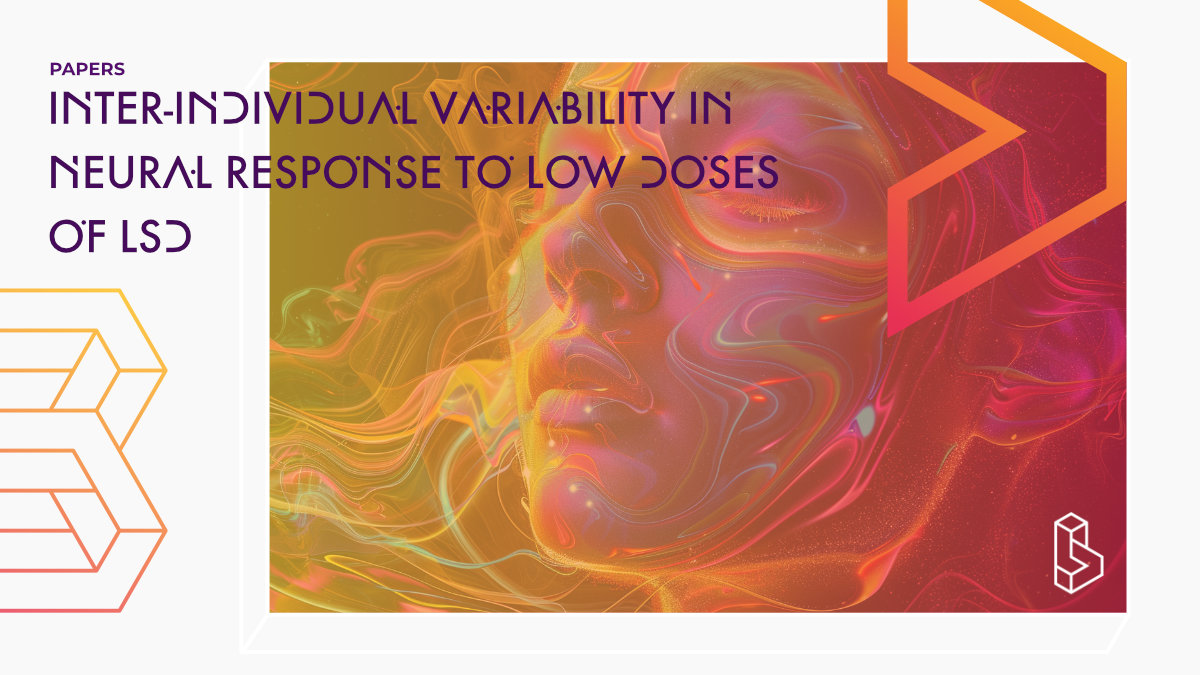This placebo-controlled study (n=53) investigates the effects of repeated low doses of LSD (15μg; 4x) on arousal, attention, and memory. LSD produces stimulatory effects, reducing EEG delta, theta, and alpha power, and enhancing pre-attentive processing, with the strongest effects in individuals with low baseline arousal. Inhibitory effects were observed in high-memory performers. The effects persisted during a 1-week follow-up, suggesting sustained neuroadaptations.
Abstract of Inter-individual variability in neural response to low doses of LSD
“The repeated use of small doses of psychedelics (also referred to as “microdosing”) to facilitate benefits in mental health, cognition, and mood is a trending practice. Placebo-controlled studies however have largely failed to demonstrate strong benefits, possibly because of large inter-individual response variability. The current study tested the hypothesis that effects of low doses of LSD on arousal, attention and memory depend on an individual’s cognitive state at baseline. Healthy participants (N = 53) were randomly assigned to receive repeated doses of LSD (15 mcg) or placebo on 4 occasions divided over 2 weeks. Each treatment condition also consisted of a baseline and a 1-week follow-up visit. Neurophysiological measures of arousal (resting state EEG), pre-attentive processing (auditory oddball task), and perceptual learning and memory (visual long-term potentiation (LTP) paradigm) were assessed at baseline, dosing session 1 and 4, and follow-up. LSD produced stimulatory effects as reflected by a reduction in resting state EEG delta, theta, and alpha power, and enhanced pre-attentive processing during the acute dosing sessions. LSD also blunted the induction of LTP on dosing session 4. Stimulatory effects of LSD were strongest in individuals with low arousal and attention at baseline, while inhibitory effects were strongest in high memory performers at baseline. Decrements in delta EEG power and enhanced pre-attentive processing in the LSD treatment condition were still present during the 1-week follow-up. The current study demonstrates across three cognitive domains, that acute responses to low doses of LSD depend on the baseline state and provides some support for LSD induced neuroadaptations that sustain beyond treatment.“
Authors: Nadia R. P. W. Hutten, Conny W. E. M. Quaedflieg, Natasha L. Mason, Eef L. Theunissen, Matthias E. Liechti, Urs Duthaler, Kim P. C. Kuypers, Valerie Bonnelle, Amanda Feilding & Johannes G. Ramaekers
Summary of Inter-individual variability in neural response to low doses of LSD
Self-reported use of low doses of psychedelics to enhance mental health, cognition, and mood has gained increased scientific attention over the last years. Still, only a few studies have validly assessed the benefits of such practices in placebo-controlled designs.
It has been shown that an individual response to a low dose of psychedelics may vary depending on several factors, including dose strength, drug concentration in blood, genetic differences in drug metabolism and receptor interactions, personality and setting.
Arousal states can be measured with resting state electroencephalography (EEG), which provides a general measure of brain activity. EEG paradigms can be employed to assess variations in event related potentials (ERPs) reflecting attentional and memory processes that might be affected by low doses of LSD.
Find this paper
Inter-individual variability in neural response to low doses of LSD
https://doi.org/10.1038/s41398-024-03013-8
Open Access | Google Scholar | Backup | 🕊
Cite this paper (APA)
Hutten, N. R., Quaedflieg, C. W., Mason, N. L., Theunissen, E. L., Liechti, M. E., Duthaler, U., ... & Ramaekers, J. G. (2024). Inter-individual variability in neural response to low doses of LSD. Translational Psychiatry, 14(1), 288.
Study details
Topics studied
Microdosing
Neuroscience
Healthy Subjects
Neurocognitive Disorders
Study characteristics
Original
Placebo-Controlled
Double-Blind
Within-Subject
Randomized
Bio/Neuro
Participants
53
Humans
Authors
Authors associated with this publication with profiles on Blossom
Nadia HuttenNadia Hutten is a Ph.D. student at the Department of Psychopharmacology and Neuroscience, Faculty of Psychology and Neuroscience, at Maastricht University. Her research aims to understand the effects of microdosing with psychedelics on mood, cognition, and mental well-being.
Kim Kuypers
Kim Kuypers is a researcher at Maastricht University. Her work is concerned with understanding the neurobiology underlying flexible cognition, empathy, and well-being. One of the main ways she does is with the use of psychedelics.
Johannes Ramaekers
Johannes Ramaekers is a professor at Maastricht University his work focuses on behavioral toxicology of drugs and combines methods from psychopharmacology, forensic toxicology and neuroscience to determine drug-induced changes in human performance. Some of this research is done with DMT.
Institutes
Institutes associated with this publication
Maastricht UniversityMaastricht University is host to the psychopharmacology department (Psychopharmacology in Maastricht) where various researchers are investigating the effects of psychedelics.
Compound Details
The psychedelics given at which dose and how many times
LSD 15 μg | 4x
